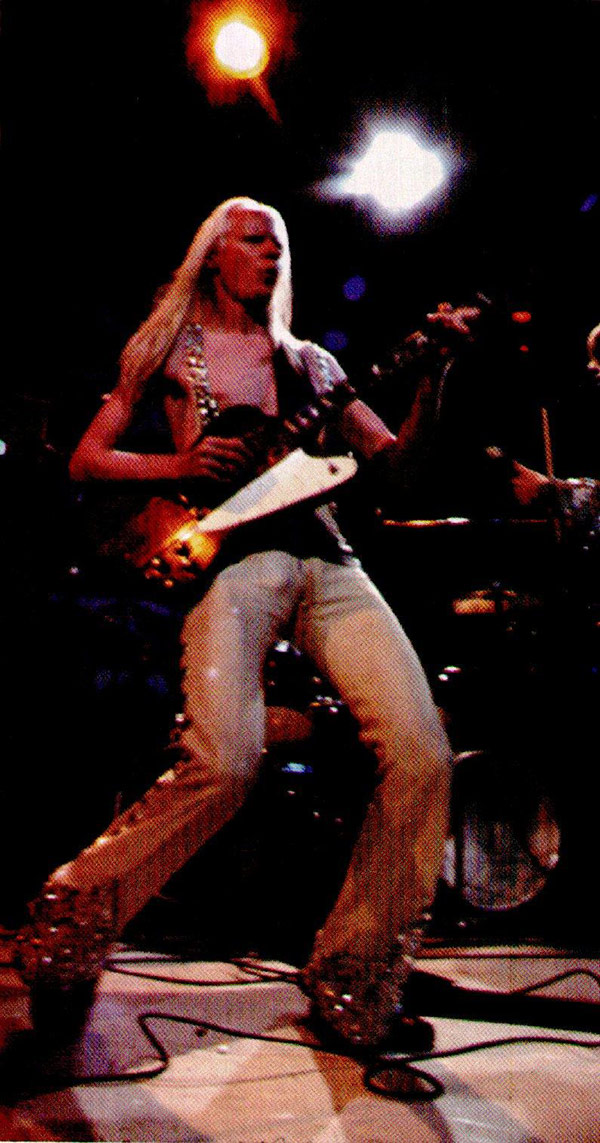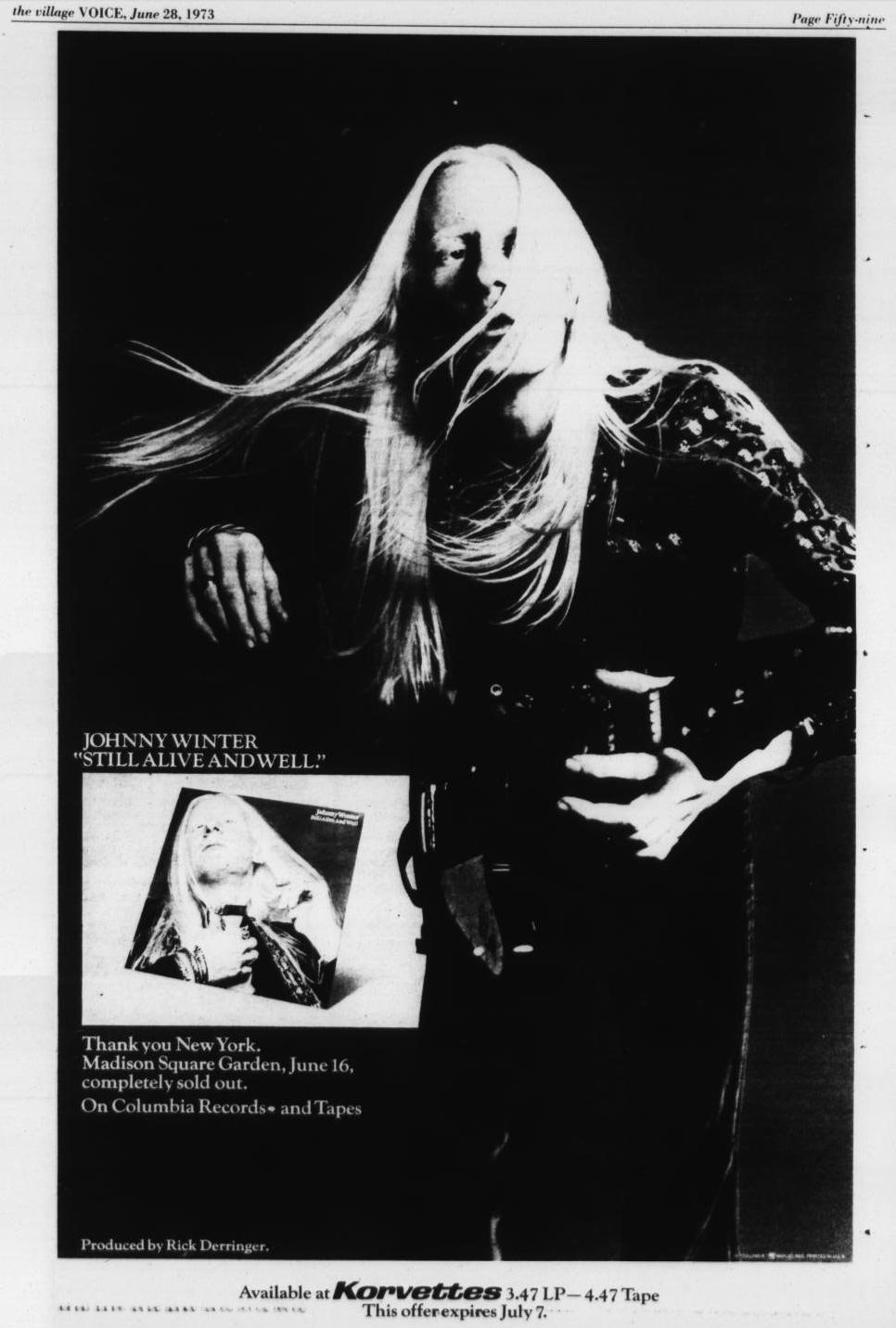Supporting act: FogHat
A review from this concert at the Madison Square Garden (Source New Musical Express)
Alive and welL still working at high temperature., YES, FOLKS, Johnny Winter is still alive and well, and he proved his recuperative abilities by selling out Madison Square Garden and thoroughly galvanising the crowd — despite the fact that while people kept yelling for "rock and roll" Winter just kept on laying down his own brand of bluesy rock (which to me is nearer rock than blues anyway).
Bearsville recording artists Foghat were the opening act, and they got off a truly flash variation of British hot rocks. They seem to be just what New Yorkers expect a British act to be — with silver suits, striped and checkered satin, endless energy output et al. Foghat's music roared outlandishly, stimulating the kids in the front rows to rise en masse, and trip the light fantastic. The band have been building a following here, so several of their numbers were known — particularly "She's Gone," from their second album, and "Leaving Again", from their first.
During the set-up for Winter, Focus's "Hocus Pocus" was played, while promoter Howard Stein implored the kids to stay in their places and get out of the stage area. It had all the makings of another Altamount, but, thank God, didn't get out of hand. Winter won over the crowd immediately when he swept onto the stage in the same black velvet gown with shocking pink satin sleeves that he wore when he sat in at Max's Kansas City with Kinky Friedman and the Texas Jewboys, and went "Nashville".
But there was nothing Country about his music, no sirree. "Still Alive And Well," Johnny's fifth Columbia album, does' contain one ripping L.A.-Country-type song, "Ain't Nothing To Me," written by The Coasters in 1963. But whereas on the album Rick Derringer played pedal steel and slide guitar, there wasn't anything resembling a pedal steel on the Garden stage. They opened with Bill Broonzy and Arthur Crudup's "Rock Me Baby," from the new album, and a shower of silver squares cascaded down from the Garden ceiling — just like Alice Cooper's funny money did.
Sashaying across the stage with the lights turning his hair bright gold and his black gown fluttering, Winter looked like a witch riding a magic guitar. And with him was this Female beating on a tambourine with a stick — and she wore this fantastic silver jumpsuit which plunged to the navel — and lower — with multi-fringe, like a bopping neon cheerleader. Johnny capered up the scales of his guitar as though he had the mid-night creep.
He stripped cutely- out of his gown down to the same kind of jump-suit as the tambourine lady. bumping and grinding with pur-pose as he did so, to delighted applause. Johnny's own "Rock And Roll", also from the new LP. followed, and then "Rock And Roll Hoochie Koo", written by Derringer (who was not on the Garden gig). He twirled his fringe like an exotic dancer, extricating his guitar strap, and working the stage. You could call him a perfectionist, but even the search for perfection has its limits. He changed his guitar in just about every song, and once, he even did it in the middle of a number.
Someone in the audience threw something which hit him, and he stopped, mid-song, to lecture them: "Next time someone hits me on the head. that's the end of the show!" He wasn't hurt, but he sure made an issue out of the action. (When you think about Alice the Coop getting beaned by that tequila bottle and still carrying out his act — even with what turned out to be a minor concussion, you have to give credit where it's due. Alice is a trouper, whereas perhaps John-ny Winter has become more of an institution than a performer).
Every other word out of his mouth was "Rock and roll!", from his lyrics to his one-liners or more extended raps. Still, although he pretended to go along with the great Boogie Rock mystique, Johnny's music was not so much rock as the song titles suggested. His guitar style has lost none of its forcefulness, and my ears crackled from the decibel level. He played opposite his bass player, Randy Jo Hobbs once of the McCoys, and also a member of the Johnny Winter And band. The long, exaggerated solos were self-indulgent. although technically clean and gilt-edged.
Imagine B. B. King at speed, dressed up like a witch doing a strip act, and you've got the picture. "Jumpin' Jack Flash" finally brought things round to rock. and it was about time. The folks wanted another chance to leap up and release their energy, and they seem to get to it no matter who performs this great rock classic. Johnny had 'em going and reached for more, thrusting the head of his guitar between the legs of the tambourine-play-ing Sex Object. There was no way he could escape without doing several encores, and the smell of sulp-phur dioxide swept the mammoth hall as cmatches were ignited as a love offering.
Kids on the balconies beseiged the lower areas with roman candles and other quick-ie flame-like devices, and the rent-a-cops started hustling and hassling. After some deliberation (which was probably faked, since Johnny seemed be have calculated nearly every move). they chose Chuck Berry's "Johnny B. Goode", with all the stops pulled out. This in-spired contributions on the cho-rus of "Go, Johnny, Go!" from the madding throng. I'll still take Chuck Berry do-ing Chuck Berry. He threw in some bravura guitar playing, on his-knees on the floor, and then the ultimate over-head, behind-back; every possible angle.
Visions of Hendrix were un-avoidable. but Hendrix copped the idea from T-Bone Walker, who originated the practise of grinding the guitar suggestively between his legs or playing be-hind his back in the '40's. All this brought raucous brayings for more, but I cut out before the last encore.

